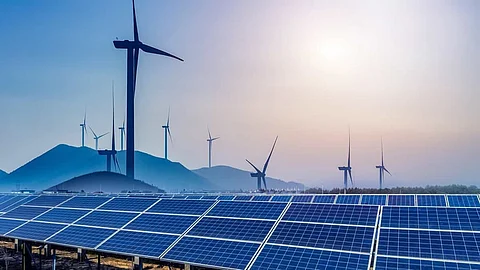

New Delhi: The Ministry of New and Renewable Energy (MNRE) on Wednesday said the recent reduction in GST on renewable energy devices from 12 percent to 5 percent will sharply bring down the capital cost of projects and improve tariff competitiveness. According to the ministry, a utility-scale solar project typically costing Rs 3.5–4 crore per MW will now see savings of Rs 20–25 lakh per MW, translating into more than Rs 100 crore in savings at the scale of a 500 MW solar park. This, the ministry said, will lower renewable tariffs and ease the financial burden of electricity procurement for discoms, with annual savings of Rs 2,000–3,000 crore nationwide.
Follow Energy Watch on X
MNRE said that by reducing project costs, the GST rationalisation will accelerate renewable capacity additions and boost investor confidence. Lower levelised tariffs are expected to improve the competitiveness of solar and wind power, strengthen discom finances, and increase consumer access to affordable clean electricity.
The ministry noted that the GST cut will make rooftop solar cheaper by about Rs 9,000–10,500 for a typical 3 kW system, encouraging uptake under the PM Surya Ghar: Muft Bijli Yojana. Farmers under the PM-KUSUM scheme will also benefit, with each 5 HP solar pump becoming nearly Rs 17,500 cheaper. At the scale of 10 lakh pumps, farmers collectively stand to save Rs 1,750 crore.
Lower GST will reduce the cost of modules and components by 3–4 percent, supporting the government’s Make in India and Aatmanirbhar Bharat push. MNRE said this will attract new investments into domestic solar manufacturing hubs, with the potential to create 5–7 lakh direct and indirect jobs over the next decade as India scales up to 100 GW of solar manufacturing capacity by 2030.
The ministry added that the reform will accelerate India’s renewable energy transition by enabling faster project commissioning and freeing up Rs 1–1.5 lakh crore in investment capacity by 2030. It also estimated that quicker deployment could help avoid an additional 50–70 million tonnes of CO₂ emissions annually by 2030, aligning with India’s Paris Agreement commitments and its target of achieving 500 GW of non-fossil fuel capacity.
Follow Energy Watch on LinkedIN
The revised GST rates will come into effect from September 22. MNRE said the reform demonstrates the government’s commitment to clean, affordable and sustainable energy, benefitting consumers, farmers, developers and manufacturers alike.
